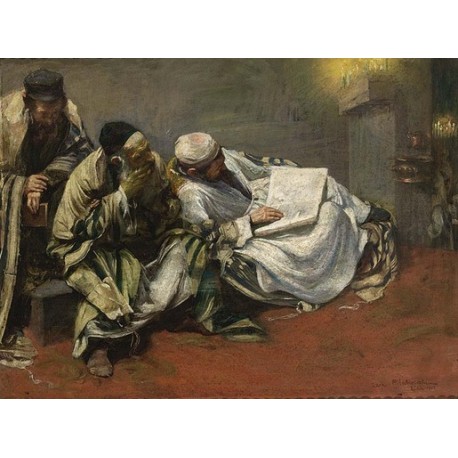Saturday – Yom Kippur
As today is Yom Kippur, I’m posting last year’s post on the Jewish holiday, along with links to previous Yom Kippur posts. G’mar Hatima Tova (which is to say, “May you be sealed in the Book of Life”).
Reprinted from October 8, 2016
I have been reading up on Yom Kippur, the Day of Atonement when Jews gather to confess their sins and ask for forgiveness. Yesterday I came across Avodah: Ancient Poems for Yom Kippur. “Avodah” is the name of the Yom Kippur service.
According to editors and translators Michael D. Swartz and Joseph Yahalom, the Avodah service, which dates back to the centuries following the destruction of the temple in 70 C.E., has always featured a rich and complex poetry. They say that though this poetry was “suppressed by generations of rabbis,”
its ornamental beauty and its deep exploration of sacred stories ensured its popularity for centuries. This literature, which produced dozens of poets and thousands of compositions before the rise of Islam, was barely known to us until the discovery of the Cairo Genizah, a treasury of discarded medieval Jewish manuscripts, at the end of the nineteenth century. It could be argued that the discovery of this literature is in fact second only in importance among discoveries of Hebrew literary texts to that of the Dead Sea Scrolls for our understanding of ancient Judaism, for it preserves linguistic forms, myths, and ways of thinking that we would not have known from Talmudic literature.
Here’s one ninth-century poem in which we see the poet asking the congregation’s permission “to entreat God on their behalf.” The poem would have preceded a key prayer. I like how it asks for the courage to speak without fear or treachery.
I implore the Rock of eternity,
Who has knowledge of the life of the innocent;
As I cast my eyes to the heavens,
I ask permission from the Merciful One.
And so too when I stand before the wise,
Who hear words from the truthful,
Who understand words of law:
I ask permission from the wise.
I look out at the congregation of the noble
And am fearful of the One who humbles and raises,
And of those standing behind me and before me as a fence.
I ask permission from the righteous,
The seed of the faithful,
Believers, sons of believers,
Who explore the law and understand.
I ask permission from priests,
Those who [ ] goodness on my behalf,
Who are satiated with good teaching and instruction.
I open my mouth with the permission of Levites,
Those who honor this day and fast,
and respond, “Holy, holy, holy”
And teach scripture and Mishnah diligently.
I open my mouth with permission of azanim [the listeners],
Those who are skilled in the subtleties of books,
Abiding in the shade of the One who dwells in mystery,
Who sing sweet, pleasant words.
I open my mouth with permission of scribes,
Those who eternally elevate the Living One,
Who say prayer before Him,
Who stand before the One who makes mountains.
I open my mouth with permission of those who recite liturgy,
Those who recite the specific and general,
Who sweep behind like water,
Who recite righteousness and justice.
I open my mouth with permission of singers,
Those who lend strong voices in melody,
Let their cry before You be pleasing.
May You consider the melody of my tongue,
I open my mouth with permission of the whole people.
O Almighty, as You forgive treachery,
Listen to my entreaties from above;
Grant me a pure heart that I may speak without fear or treachery.
I open my mouth with permission of the entire congregation.
Previous Yom Kippur posts
Adrienne Rich’s Yom Kippur Thoughts about Conflict
Jane Kenyon: Thirsting of Disordered Souls
Rashani: Out of Darkness, Sanctified into Being
